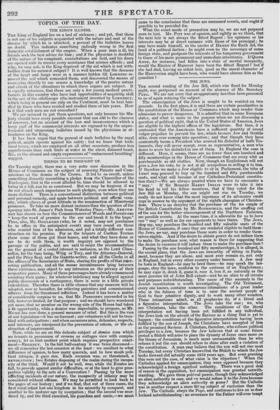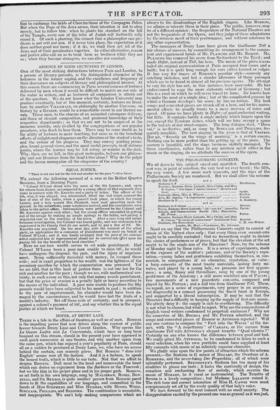THE JEWS.
THE second reading of the Jew Bill, which was fixed for Monday night, was postponed on account of the absence of Mr. Secretary PEEL. We are not sorry that an opportunity has thus been presented to us of again noticing the subject. The emancipation of the Jews is sought to be resisted on two grounds. In the first place, it is said there are certain peculiarities in the constitution of the House of Commons which may render their admission to power dangerous. It is admitted that in, some European states, and what is more to the purpose when we are discussing a question of political right, that in the United States of America, Jews are eligible to the highest offices of the legislature. But then, it is contended that the Americans have a sufficient quantity of sound vulgar prejudice to prevent the law, which favours Jew and Gentile alike, from ever coming into operation ; and that though they have contentedly borne a President who avowed his disbelief of both Tes- taments, they will never accept, even as representative, a man who dares to avow his disbelief in one of them. In England the case is different. Here, it seems, there are no fewer than one hundred and fifty memberships in the House of Commons that are every whit as purchaseable as old clothes. Now, though an Englishman will not give a Jew his vote, he is not at all scrupulous in selling it to him. If therefore we make a Jew eligible to sit in Parliament, the tribe of Israel may proceed to buy up the hundred and fifty purchaseable seats, and what will become of our Catholico-Protestant Constitu- tion then ?—We are always puzzled when we have to encounter a "may." If Sir ROBERT HARRY INGLIS were to take it into his head to tell his fellow members, that if they voted for the Jew Bill on Monday, the sun might not rise on Tuesday, we really do not know what the most ingenious of its advocates could urge in answer to the argument of the eighth champion of Christen- dom. There is no denying that the purchase of the fee simple of the British Constitution by Mr. ROTHSCHILD, and the snuffing out of the sun for the better encouragement of the Northern Fisheries, are possible events. At the same time, it is allowable for us to have our "may" as well as for our opponents to have theirs. The Jews, they say, may purchase the hundred and fifty saleable seats of the House of Commons, if once they are rendered eligible to held them: the Jews, we say, may purchase those seats in order to render them- selves eligible. And if the desire to obtain power do not induce them to make the purchase now, what reason is there for supposing that the desire to exercise it will induce them to make the purchase then? Passing by the one hundred and fifty memberships, it is alleged, in the second place, that the Jews are unworthy of sitting in Parlia- ment, became they are aliens, and must ever remain so, not only in England, but in every other country under heaven. A Jew may be born in England—he may be bred there—he may speak the lan- guage, obey the laws, conform to the customs of an Englishman; he may cigar it, drink it, game it, race it, box it, as naturally as the most genuine bit of John Bull extant—and be an alien to all intents and purposes notwithstanding. The cause of this anomaly in the Jewish constitution is worth investigating. The Old Testament, every one knows, contains numerous intimations of a great leader who in the fulness of time is to raise the ancient people of God to their primitive dignity, and to work many other wonders. These intimations admit, as all prophecies do, of a literal and a figurative interpretation. The Jews take the one ; we, who are Christians, take the other. The conditions of the literal interpretation not having been yet fulfilled in any individual, the Jews look on the advent of the Saviour as a thing that is yet to happen : the conditions of the figurative interpretation having been fulfilled by the son of Joseph, the Christians have accepted of him as the promised Saviour. A Christian, therefore, who refuses political privileges to a Jew, because the Jew believes that at some future period a Shiloh will arise to place the dynasty of Jesse once more on the throne of Jerusalem, is much more unreasonable than he who refuses it lest the sun should refuse to shine after such a violation of the constitution. A man may believe that the sun will not rise next Tuesday, but every Christian knows that the Shiloh to which the Jew looks forward did actually come 1830 years ago. But even granting this were not the case, of what value is the objection ? When the Catholics applied for emancipation, they were opposed because they acknowledged a foreign spiritual authority. There was a good deal of reason in the opposition, but emancipation was ,granted notwith- standing. We gave them political power, though they acknowledged an alien authority in ease, and we would refuse it to the Jews because they acknowledge an alien authority in posse! But the Catholic was in another respect a more fitf.ng subject of exclusion than the Jew. The Catholic obeys the Pope, and continues to live on in dear Ireland notwithstanding: no reverence for the Father will ever tempt him to exchange the fields of Clarefor those of the Campagna Felice. But when the Pope of the Jews arises, their intention is not to obey merely, but to follow him : when he plants his standard on the hill of- the Temple, every son of the tribe of Judah will forthwith rally round it. Of such a planting,' the utmost that a philosopher can pre- dicate is aut erit aut non. If it never take place, the expectation of it does neither good nor harm ; if it do, we shall then get rid of the Jews and of their peculiarities together. In either alternative, reason atid justice alike call on us to treat them as brethren while they are so ; when they become strangers, we can alter our conduct.



















 Previous page
Previous page